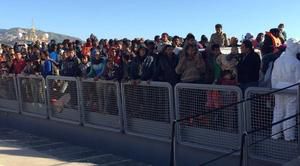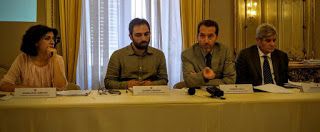Around the CARA of Mineo
The news about
more people investigated for corruption and incitement of corruption related to
the affairs concerning the CARA* of Mineo arrived yesterday. The notices of
investigation, which have been handed over to five people of the municipal
commission suspected of having promised working permits, regard the names of
the mayor of Mineo and Paolo Ragusa, who is the former president of the
cooperative Sol. Calatino.
Meanwhile,
migrants continue to be sent to the CARA after arriving by boat as well as from
other centres as if nothing has happened. The situation of overcrowding within
the centre is thus implicitly accepted and established by the institutions, which
do not even feel obliged to give explanations any more. In the meantime,
thousands of migrants continue to struggle against the cancellation and
alienation accentuated by a prolonged stay in such a place. Outside the CARA,
migrants begin to stop being only numbers and are increasingly able to get to
know the country in which they arrived – even though not always in the best
way. We meet many of them in Catania, often with the rejection letter of the
local Commission hold tight in their hands, desperately looking for a lawyer
who may assist them during the court appeal and, even more, looking for someone
who may listen to them for about 20 minutes.
Some of them do
not hesitate to show all their frustration and mistrust towards a system that
forced them into a limbo for more than a year and later sentenced over their
future through an interview to which no one accompanied them with an adequate
legal counseling. Many discover only at the court appeal about the importance
of sharing their lived experiences – which they did not reveal to the
Commission because not regarded as necessary – and of the marks they have on
their own bodies, which they did not regard necessary to show during the
interview and which have not been certified by any doctor. From here an
exasperating and sometimes obsessive call for help and closeness to those who,
instead, they find willing to help, and a gradual opening up which allows them
to reveal some of the details about their life inside the CARA.
A., for example,
who has been staying at the CARA for over a year, complains about an acute pain
that forced him to the doctor looking for a remedy that was not the usual
“OKI”, with a destroyed back after working for months on the fields: “If I do
not have money I can’t do anything; I can’t either move nor send [the money]
back home. With no money and no papers everybody knows which jobs you can do.”
Like him, many more with whom we may never speak, and who are at the CARA without
papers, are attractive merchandise for any kind of exploitation.
And still,
although in the midst of such justifiable desperation, there are still some who
endure and try to live together with the sense of powerlessness and the
constant thought of the papers, which after months and months are still out of
sight. M. arrived in Mineo after becoming full of age – he was transferred from
another centre for minors where he spent his first five months in Italy. We met
him outside the centre, where thanks to a flyer that has been distributed by
the Antiracist Network of Catania he learns to his great disbelief about the
conditions, rights and duties of who is asking for international protection and
resides in a CARA. “Here I am fine, the only thing is that we are far away from
any city or village. And there are really too many persons. But here it is
better than in the Palaspedini and maybe even better than the place where I was
staying before.”
These statements
leave us quite upset, but they are confirmed also by other comrades of M. who
arrived here with him after becoming 18 years old.
Others pass us by
on their bicycles directed to work or to the Italian language school, or take ‘abusive’
cabs that take them to the city for five euros a ride. “I think that I will
soon ask to become part of the football team”, C. tells us, “so that when we
have an away-match I can move for free”. Strategies and thoughts for not losing
the hope of a better future, sought with lots of determination. But how long
may they last?
After having
carefully read the guide for international protection that we gave him, a guy
from Senegal asks us what that piece of paper is needed for. He has been inside
the CARA for 18 months now; he had his hearing at the Commission a few months
ago and was rejected. Hence he sought a lawyer from Catania for the court
appeal, which will probably be deposited in August. After long waiting, this
young Senegalese man wants to wait for obtaining a residence permit that he
should get after some months following the deposition of the appeal, for then
leaving the CARA and travelling to Germany. He knows that the risk is to be
sent back to Mineo, but nonetheless “c’est la chance”.
Before crossing
the Mediterranean Sea he was in Libya and did not choose out of his free will
to travel, but was forced to embark on a boat to Italy. There are many things he doesn’t understand
regarding the reception he received. He thought he was travelling towards a
better country, but had to reconsider this point. Inside the CARA there are no
guaranteed medical examinations as well as no clothes, which he had to search
in the garbage. The waiting times are extremely long and in the meantime he
didn’t receive any kind of papers. After the rejection he was forced to leave
Mineo and to sleep on the street until the court appeal.
He confusedly
refers to the reasons why people have the right for international protection, mentioning
mainly the war, and he can’t explain himself why, considering that in his
country there is a war going on, he wasn’t granted protection. Even less he
understands why he needs to go to a lawyer, when usually people who kill, rob,
or act against the law seek lawyers, while he himself didn’t commit any of
this.
He doesn’t
understand the utility of the mini-guide on international protection, which we
gave him, because also others before us explained him his rights – but despite
all this he sees that everything stays the same, no one acts in favor of
changing things. He says that we should be the ones who change the situation,
because if they protest themselves the Commission will punish them through a
rejection.
At some point of
our conversation, moved by all the frustration for all what he is going
through, he says that it would have been better to die in the sea rather than
staying in this place.
Giulia Freddi and
Lucia Borghi
Borderline
Sicilia Onlus
*CARA – Centro di accoglienza
per richiedenti asilo: hosting/reception centre for asylum seekers
Translation:
Chiara Guccione


